DOE proposes creation of nuclear energy commission

Following the issuance of an executive order (EO) allowing the adoption of nuclear energy into the country’s power mix, the Department of Energy (DOE) is proposing the creation of a separate agency that will regulate the nuclear power industry.
At a virtual press conference on Thursday, Energy Undersecretary Gerardo Erguiza Jr. said that the DOE proposed to the House of Representatives a measure creating the Commission on Nuclear Energy.
“Now that we have the policy, the DOE will push now that the regulatory framework submitted to the Senate... We have this separate body, a specialized body to see to it that everything, with all the safeguards needed, are duly monitored and implemented,” he said.
On Thursday morning, President Rodrigo Duterte issued EO 164, a by-product of the EO 116 issued in 2020 that directs the conduct of relevant studies for the adoption of a National Position for a Nuclear Energy Program, and constituted the Nuclear Energy Program Inter-Agency Committee (NEP-IAC) to oversee its preparation.
"The national government commits to the introduction of nuclear power energy into the state's energy mix for power generation. The state will ensure the peaceful use of nuclear technology anchored on critical tenets of public safety, national security, energy self-sufficiency, and environmental sustainability," the EO, dated February 28 but only released on March 3, states.
The EO also states that the national "government will assess, review and develop nuclear energy plans using integrated approaches that consider both the provision of energy supplies, and the role of energy efficiency in meeting increasing demand for energy."
According to the government, projected demand for a clean energy pathway in the country is expected to grow at 4.4% a year, requiring almost 68 gigawatts (GW) of additional capacity by 2040.
In a separate statement, the DOE welcomed the issuance of EO 164.
“We thank the President for seeing merit in the DOE’s recommendation to consider integrating nuclear energy into our country’s energy mix. Since we want a stable, reliable, and sustainable energy resource, I believe that nuclear energy is the way to go,” Energy Secretary Alfonso Cusi said.
For his part, Erguiza said that “adopting a nuclear program is not just about constructing nuclear power plants. It is a matter of energy and national security. Should it be decided in the future that the Philippines is fit and finally ready to embark on its nuclear energy journey, then we would be able to look back and appreciate this landmark issuance.”
“EO 164 opens the door for the next administration to tap this resource to support our ever-growing energy needs in the years ahead,” Erguiza added.
The EO further states that the government is committed to pursue the highest standards of nuclear safety, security and safeguards, including provision for civil liability, to fulfill its obligations under international treaties, and other international conventions and agreements.
The EO also mandates the NEP-IAC to collate all audits and recommendations, conduct further studies and assessments and if necessary, and make recommendations on the use and viability of the Bataan Nuclear Power Plant (BNPP) and the establishment of other facilities for the utilization of nuclear energy.
The Philippines last ventured into a nuclear program in 1976 when then-President Ferdinand Marcos ordered the construction of the Bataan Nuclear Power Plant (BNPP).
The BNPP project, which cost as much as $2.3 billion, however, was shelved after three years due to safety concerns. — BM, GMA News



